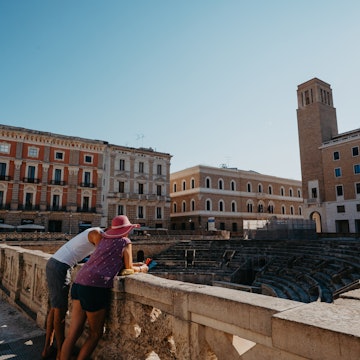
12 things you need to know before traveling to Puglia, Italy

Apr 11, 2025 • 6 min read

Traditional trulli in Alberobello. Paradise at risk/Shutterstock
Once an underappreciated gem, Puglia is now on the radar of eager tourists who come to explore the intriguing places across this region stretching down to the heel of Italy's boot, though it is still less visited by foreign visitors than other coastal areas of the country.
From the splendid beaches of the Gargano and Salento peninsulas to history-filled cities like Bari, Lecce and Taranto and picturesque towns like Ostuni, embrace the rhythm of local life in Puglia, whether that's taking an afternoon nap, deploying a few simple phrases in Italian or knowing just where to buy a train ticket.
These travel tips will make your visit to Puglia as breezy as a seaside perch above the Ionian Sea.
1. Allow more than a few days
You’ll need more than a few days to truly see all of Puglia's most incredible sights. It is quite a long region, and driving from its northernmost point to its southernmost tip takes around five hours. To make the most of your time, plan to stay in a couple of different bases, so you can reduce your travel time between destinations. Two weeks will give you ample time to enjoy both getting lost in historic town centers and sprawling on a beach under the sun.

2. Summer is amazing, but the shoulder season is better
If you want to experience a true Italian summer, then July and August are the months to do that. It doesn’t get much more summery than this, but you’ll have to share towns and beaches with quite a lot of fellow tourists. Since it’s the high season, prices shoot up, too, as does the temperature, which can become difficult to manage if you’re walking around cities filled with stone buildings that reflect their heat on you.
The best times to visit Puglia are its shoulder seasons, so mid- to late spring and then September until mid-October. The weather is milder but still lovely enough to take a dip in the sea, and there aren’t as many crowds – especially in September, when most Italians have returned to their everyday lives of work and school.
3. It's possible to get around by train
While renting a car remains the best option to get around Puglia at your own pace and with all the flexibility that making your own schedule allows, you can still reach major cities by train. And when it comes to trains, the Trenitalia app is an absolute must-have. Relatively easy to navigate, the app tells you everything there is to know about routes, schedules and prices. You can also buy tickets through the app, so you can skip any potential lines at ticket offices or bypass the problem of there not being a ticket office altogether.
4. Look beyond ticket offices
Ticket offices might not be that easy to find, especially when it comes to buses or train stations in smaller towns. In that case, look around for a tabaccheria (tobacco shop) or edicola (newsstand), where you can usually purchase tickets — and avoid the possible additional fees of buying them on board a bus or train.

5. Be mindful of road signs
Having your own car may be the easiest way to explore, but beware of the risk of fines. When in bigger cities, look out for ZTLs (Limited Traffic Zones). Entering a ZTL might land you with a pretty considerable fine that is sure to put a damper on your vacation. Check street signs carefully: entrances to ZTLs will usually be marked with a white sign that has a red circle and the phrase “Zona a traffico limitato” in black.
6. Make summer bookings in advance
During the high season, booking in advance is recommended for everything, especially at the beach clubs, or lido, on the coast of Puglia. While you can definitely find free beaches where all you have to do is lay down your towel and plant your umbrella, if you want to partake of the amenities of a lido — like beach chairs, changing rooms, a bar, sometimes even small soccer pitches and beach volleyball courts — it’s better if you reserve your spot well in advance.

7. Leave swimwear by the water
Even if you’re in a coastal town with the most magnificent beach you’ve ever seen, swimwear should only be worn when you’re actually on the beach. Several towns have regulations against wearing swimwear when strolling around their centers, and it’s generally something that Italians simply don’t do — just throw on a dress or shirt to cover up and you’re good to go.
8. Do not disturb during the pennica
There’s only one solution to beating the high summer heat: sleeping through the hottest hours of the day. This is a sacred moment for locals in Puglia and in Italy more broadly. The pennica (afternoon nap) can happen anywhere from midday to about 5pm, and you shouldn’t be surprised to see shops and others activities close during those hours and reopen later in the afternoon. That’s just the rhythm of life in Puglia, so take it in stride and nap away.
9. Bone up on some basic Italian
While the staff at your hotel or hostel or a restaurant in a major city in Puglia will probably know some English, the same isn’t true for the people you might encounter in a small village by the road. Learning some basic sentences in Italian is a good way to make sure you’re not completely cut off from locals around you should the need arise, and it’s a generally appreciated courtesy that immediately puts the people you’re talking with in a good mood.
Greet people with "buongiorno" (good morning) or "buonasera" (good evening). Instead of "please" and "thank you" say "per favore" and "grazie." To ask about a price, say "quanto costa?" and to find the nearest bathroom, ask "dov’è il bagno?" To make your way back to English, explain that you don’t speak Italian well ("Non parlo bene italiano") and ask if the other person can talk to you in English ("Parli inglese?" or "Parla inglese?", to be polite).
10. Perfect your greetings
You may notice that Italians often exchange two kisses on the cheek as a hello. While that is usually reserved for friends and relatives — you won’t be expected to do the same with someone you just met — there’s definitely an etiquette to keep in mind. It is considered polite to greet people when entering a shop, especially if it’s a smaller one, or a restaurant with a quick buongiorno or buonasera, which will always be well received and likely reciprocated.

11. Keep some cash on hand
While almost every establishment in major cities and tourist areas will have no problem accepting electronic payments, cash might be appreciated in smaller towns and villages. Keep a small amount of euros in cash in case the cafe where you’re eating or a souvenir vendor doesn’t take cards.
12. Take common sense safety precautions
Don’t believe the rumors that say it is not safe to travel to Puglia. This stereotype – with some foundation in truth but not as extreme as you might have been led to believe – lingers in the south of Italy. Use the same common sense you would when traveling anywhere and be especially aware of pickpockets. If you have a car, don’t leave anything of value that can be seen through the windows.















